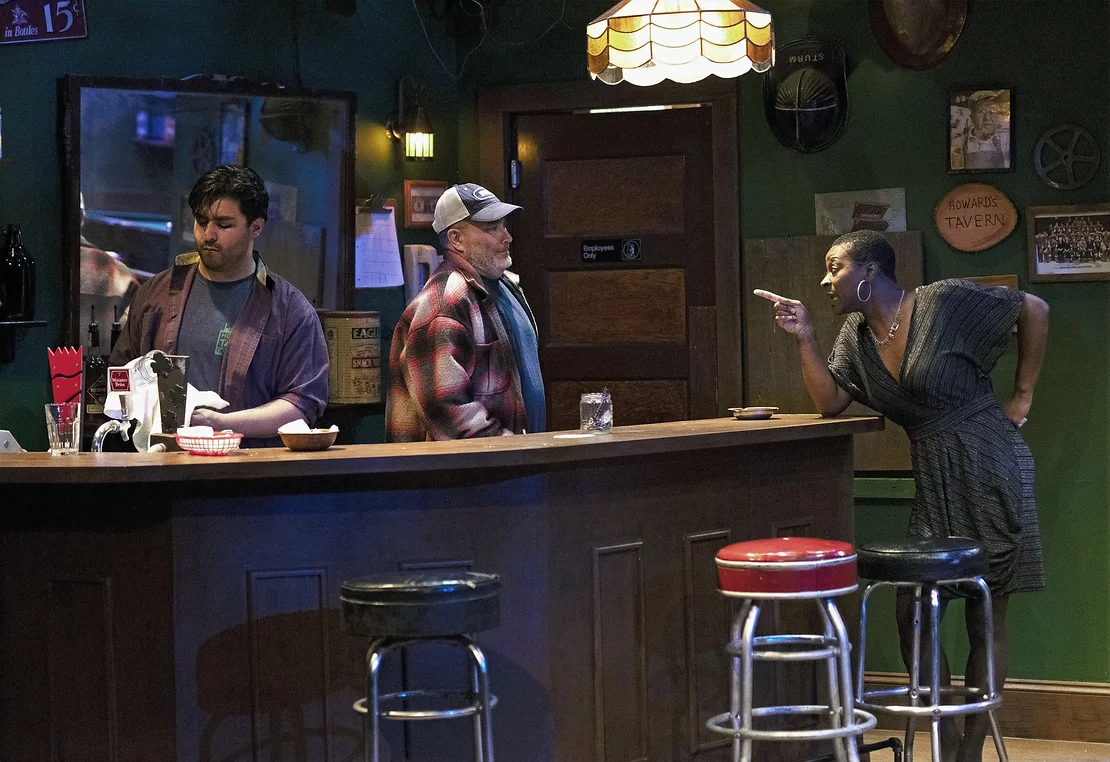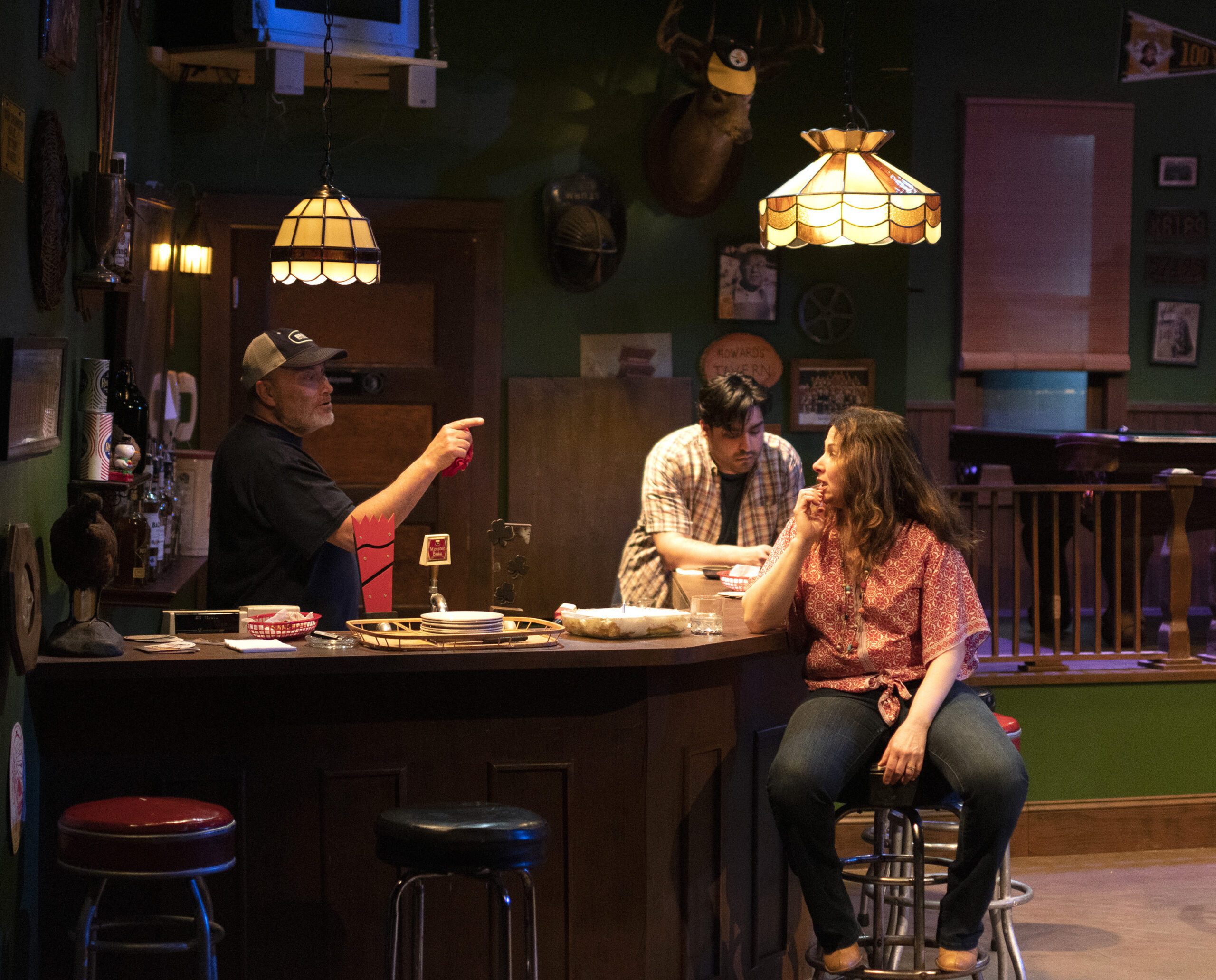A Rustbelt Story We Know All Too Well
by Ann Marie Cusella

the 2017 Pulitzer Prize winner is playing at RLT
the Lives of Factory Workers
Sweat, the 2017 Pulitzer Prize winning play by Lynn Nottage set in Reading, Pennsylvania, is a powerful indictment of corporate and government policies and the human cost of those policies as seen through the lives of the factory workers affected by them.
Begun as early as the 1950s, but put into effect in earnest during the 1970s, policies that resulted in factories and jobs being outsourced to foreign countries or to cheap labor in other parts of the country caused the decline of once thriving Factory Belt cities in the Northeast and Midwest. Those areas became known as the Rust Belt due to economic decline, population loss, and urban decay as a result of the policies.
Buffalo is one of them. In the 1940s, Bethlehem Steel in Lackawanna was the largest steel factory in the nation, employing over 20,000 people. In 1982, almost all of the remaining employees, 6,000 of them, lost their jobs and the factory stopped producing steel at all.
In Reading in 2011, 41.3% of residents were living below the poverty line. Having been dependent on industrial manufacturing, it had become the poorest city in the nation. Ms. Nottage interviewed residents of Reading while researching her play.
Welcome to the Working Class
Howard’s Tavern is the setting for most of the play. Set Designer Gina Boccolucci has captured the feel of working class bars, including a pool table on a raised platform. The time shifts between 2008 and 2000 when most of the events in the play occurred.
The play opens in 2008 with two young men recently released from jail, Jason (Johnny Barden) and Chris (Jake Hayes) speaking separately to their parole officer, Evan (Peter Johnson). Their crime itself is not discussed, but Chris says that “what we did is unforgivable”, while Jason, sporting various white supremacist tattoos on his face, remains unmoved and full of rage.
A flickering tv screen above the bar in the tavern provides the date of the scene, along with occasional clips of George W. Bush talking about the North American Free Trade Agreement (NAFTA), and the later recession.
Stan (David Mitchell) is the bartender and Oscar(Alejandro Gabriél Gómez), whose family is from Colombia, is the bar back. Tracey (Lisa Vitrano), Cynthia (Davida Tolbert), and Jessie (Diane DiBernardo), three friends who have worked the line at a local factory for many years, frequent the bar. Brucie (John Vines) is Tracey’s ex, who has become a drug addict after being locked out of his job for almost two years at a different factory. Jason is Tracey’s son, and Chris is Cynthia’s. The young men also work at the factory and are best friends in 2000 when most of the action takes place.
In 2000, Cynthia, an African American woman, decides to apply for a managerial position, and Tracey decides that she will, too. Cynthia gets the job at a time when major changes are on the horizon. Union workers go on strike. Managers are caught in the middle. And new employees who cross the picket line replace the striking workers.

Get ready for blood, sweat and tears
Universal Themes
In what must be a universal theme, the people with the least and who have the most to lose, begin to resent and fight with each other, not realizing they are being manipulated, while the offstage owners who have created the situation, become ever more wealthy.
A rift between Cynthia and Tracey, jealous of Cynthia’s promotion, becomes serious. Racial tensions emerge. Jason becomes even more rageful, and Stan tries to mediate between all of them. When Oscar crosses the picket line and takes a job at the factory, events begin to spiral out of control.
The pride the workers feel in their jobs and their ability to take care of their families, along with the general grousing about the work itself, along with the interracial tensions that arise, and the shame that results when people are no longer able to take care of themselves and their families, are spot on in this extremely well-written play. It captures the essence of the working class who worked and partied hard and thought their way of life would never end. Alcoholism, drug addiction, depression and rage often go hand in hand with the descent into poverty of once proud people.
The acting is superb, to a person. Each actor inhabits the nuances of their characters with skill and an understanding of the character’s motivation. As relationships disintegrate and fear, guilt, and shame replace optimism, each one ably portrays their character’s response to their changes in status and lifestyle.
Beauty in the Human Struggle
Director Victoria Pérez has all of this well in hand. In complex and lengthy scenes with four or five (or more) characters engaged, there is never a moment of confusion for the audience. The fight scene is complex and well choreographed by Fight Director Adriano Gatto.
The entire production has a working class vibe that feels very realistic, from costumes by Jenna Damberger, to Sound/Projection Design by Nicholas Quinn, who chose relevant songs to play during scene changes.
While this play takes place in the early 2000s, the themes are timeless. Every generation of working class people fight for a better life. In the 1930s steel workers fought the Pinkertons on picket lines to be able to unionize in Buffalo. Today, Starbucks workers in Buffalo who want to unionize are intimidated or fired by ownership. Even in the service economy, the worker bees must fight for their daily bread.
Sweat depicts this struggle in very personal, human terms. Road Less Traveled Theater’s production is a powerful one and not to be missed by serious theater-goers.
Dates, Tickets and More Information
Sweat is playing at Road Less Traveled Theater from April 20th – May 21st, 2023.
0 Comments